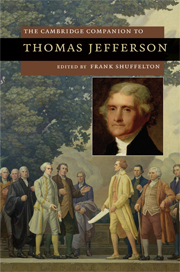Book contents
- Frontmatter
- Introduction
- 1 The Declaration of Independence and the new nation
- 2 Jefferson’s conception of republican government
- 3 Notes on the State of Virginia and the Jeffersonian West
- 4 Jefferson and Native Americans: policy and archive
- 5 Race and slavery in the era of Jefferson
- 6 Jefferson’s people: slavery at Monticello
- 7 Jefferson, science, and the Enlightenment
- 8 Thomas Jefferson and the creation of the American architectural image
- 9 The politics of pedagogy: Thomas Jefferson and the education of a democratic citizenry
- 10 Jefferson and religion: private belief, public policy
- 11 Jefferson and the language of friendship
- 12 Jefferson and Adams: friendship and the power of the letter
- 13 The resonance of minds: Thomas Jefferson and James Madison in the republic of letters
- 14 Jefferson and the democratic future
- Further reading
- Index
10 - Jefferson and religion: private belief, public policy
Published online by Cambridge University Press: 28 May 2009
- Frontmatter
- Introduction
- 1 The Declaration of Independence and the new nation
- 2 Jefferson’s conception of republican government
- 3 Notes on the State of Virginia and the Jeffersonian West
- 4 Jefferson and Native Americans: policy and archive
- 5 Race and slavery in the era of Jefferson
- 6 Jefferson’s people: slavery at Monticello
- 7 Jefferson, science, and the Enlightenment
- 8 Thomas Jefferson and the creation of the American architectural image
- 9 The politics of pedagogy: Thomas Jefferson and the education of a democratic citizenry
- 10 Jefferson and religion: private belief, public policy
- 11 Jefferson and the language of friendship
- 12 Jefferson and Adams: friendship and the power of the letter
- 13 The resonance of minds: Thomas Jefferson and James Madison in the republic of letters
- 14 Jefferson and the democratic future
- Further reading
- Index
Summary
Jefferson was of two minds on the subject of religion, which has sometimes confused both his critics and his champions. He wrote John Adams in 1817: “If by religion we are to understand sectarian dogmas, in which no two of them agree, then your exclamation on that hypothesis is just, “that this would be the best of all possible worlds, if there were no religion in it.” But if the moral precepts, innate in man, and made a part of his physical constitution, as necessary for a social being, if the sublime doctrines of philanthropism and deism taught us by Jesus of Nazareth, in which all agree, constitute true religion, then, without it, this would be, as you again say, “something not fit to be named” even, indeed, a hell.” Jefferson had little use for the “sectarian dogmas” which were commonly called “religion,” yet he believed that “the moral precepts, innate in man,” were essential. The latter constituted “true religion.” There are two sides to the story of Jefferson's religious ideas - private and public. What were Jefferson's personal religious beliefs? And what did Jefferson mean when he said in his famous letter to the Danbury Baptists that there ought to be a “wall of separation between church and state.” / Jefferson's religious journey / Jefferson's religious opinions changed as he aged. Jefferson's family raised him in the Anglican church. Either before or during his college years, he drifted away from whatever Christian faith he had, and remained rather skeptical through much of his adulthood. In the mid-1790s, or perhaps a bit before then, he started to study the life, works, and philosophy of Jesus quite closely. In time he would edit his own, personal edition of the Gospels and would think that Jesus was one of history's greatest moral teachers.
- Type
- Chapter
- Information
- The Cambridge Companion to Thomas Jefferson , pp. 143 - 154Publisher: Cambridge University PressPrint publication year: 2009
- 3
- Cited by



